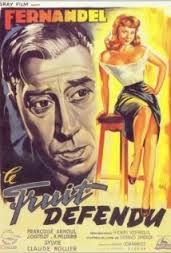
FORBIDDEN FRUIT
France, 1952, 103 minutes, Black and white.
Fernandel, Claude Noller, Francois Arnoul, Sylvie.
Directed by Henri Verneuil.
Forbidden Fruit is an early '50s French drama based on a story by Georges Simenon. It is a portrait of middle-class France in the early '50s.
The film, told in flashback style with a doctor remembering an affair on the occasion of his 45th birthday, focuses on the doctor, his work in Arles, his relationship with his second wife, the monotony of his routine situation. He also remembers his encounter with a young woman and the almost accidental beginning of an affair, its effect on him in his mid '40s, his possessiveness towards the young woman, his schemes of introducing her into his household and her working for him, the unmasking and his having to take stock of himself.
The film was directed by Henri Verneuil, later, especially in the '60s, to be the director of a great variety of international action films: The Burglars, Night Flight to Moscow. The film stars Fernandel, better known as a comedian (and as Don Camillo in the film series) who is believable as the doctor. Francoise Arnoul is the young woman.
The film is typical of so many of the dramas made at this period and the portrait of French manners and morals.
1.The title, the focus on Charles, his relationship with the young woman and its effect on his life, on his family?
2.Black and white photography, the naturalistic settings of the French provincial city, the streets, homes, doctor's surgery? The trains, the naturalistic atmosphere of life in the period? The musical score?
3.The familiar story, the mid-life crisis, the shifting relationships, the professional man dissatisfied with himself and his career, temptation, reaching for forbidden fruit? The handling of this theme - with the explicitness and reticence of film styles in France of the early '50s?
4.Fernandel, better known as a comedian, the credibility of his serious role? As the 45-year-old doctor? His home, the dominance of his mother, the coldness of his wife, his child? His work? Being called out and going to assist in the birth - and the affection of the couple and their gratitude towards him (wanting to call their child after him)? His 45th birthday party? His going back over the affair on this occasion and trying to take stock of himself? His life in the town, his work, reputation? His friends, place in society? His wife and his previous marriage? The dominance of his mother and her choosing his wife - and her hostility towards his second wife? His restlessness, going to the city, shopping for his wife, the irony of his missing the train, the encounter with the young girl, his having a drink with her, their discussions, the beginning of the infatuation, the hotel and his reserve in spending the night together? His sudden outburst of passion? His welcoming her to the town, his pretending not to know her? The visit to the bar, the rivalry with the bar owner, Charles's jealousy? His bringing her to his home, the response of his wife, her generosity, offering her the room, money? His manipulation of his wife? Celebration, the wine, her placed in his household? Her efficiency as his assistant? The pressure from the bar owner - and the medical examination? The affair, his growing impatience, his lying to his wife, going out, his jealousy towards the bar owner and discovering him with another woman? The parade, the rumours, his wife discovering the truth, the young girl and her reaction, being oppressed, leaving him? The confrontation with his mother and wife, his decision to leave the house? His missing the train? Seeing the girl and her not leaving town - and his return home? His future?
5.The portrait of his wife, a cold and austere woman, generous, her resignation at her husband's behaviour? Her future with him?
6.His mother, her presence in the household, her dominance, interference, blaming his wife - and her turning the blame on his mother and her pampering her son and bringing him to this state?
7.Charles and his friends, their support, the party?
8.The owner of the bar, his relationship with the girl, inviting her to Arles? The visit to the doctor? The false accusation - and his revealing the truth to Charles?
9.The young girl, her background, restlessness, meeting the bar owner, the promise of a job, the encounter with Charles, seductive, going along with him - not realising where the affair would lead? Her accepting the lies and telling them to the family, her welcome in the family, her work with Charles? Her waiting for him - and his being delayed by the meeting about the parade? Her boarding and the suspicions of her landlady? Her decision to leave, the clash with Charles, her not leaving the town? Her moving on to similar situations?
10.The moral perspective of the film? The middle-aged man, his crisis, the young woman? Manners and morals of the period?